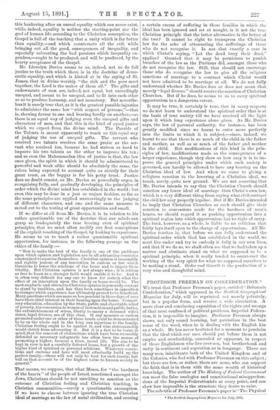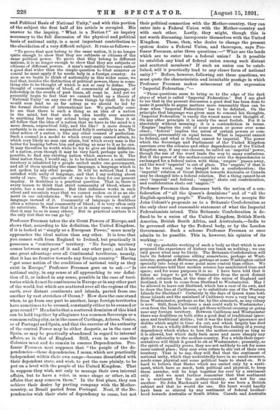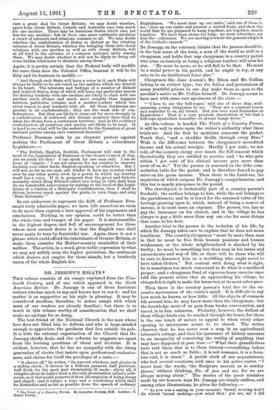PROFESSOR FREEMAN ON CONFEDERATION.* WE trust that Professor Freeman's paper,
entitled" Britannic Confederation," which appeared in the Scottish Geographical Magazine for July, will be reprinted, not merely privately, but in a popular form, and receive a wide circulation. A more clear and convincing exposition of the rights and wrongs of that most confused of political problems, Imperial Federa- tion, it is impossible to imagine. Professor Freeman always shows, not only sound learning, but patriotism in the best sense of the word, when he is dealing with the English kin as a whole. He has never hesitated for a moment to proclaim. that the ideal which our race should put before them is not empire and overlordship, concealed or apparent, in respect of those Englishmen who live over-sea, but brotherhood and unity in sentiment and aspiration as in language. There are many men, inhabitants both of the United Kingdom and of the Colonies, who feel with Professor Freeman on this subject ; but there are few, or rather, there are none, who can support the faith that is in them with the same wealth of historical knowledge. The author of The History of Federal Government can meet the false analogies and constitutional misapprehen- sions of the Imperial Federationists at every point, and can show how impossible is the structure they desire to raise.
The sub-title of Professor Freeman's paper is "The Physical
• The Scottish Geographical Magazine for July, 1801. and Political Basis of National Unity," and with this portion of the subject the first half of his article is occupied. His answer to the inquiry, "What is a Nation F" an inquiry necessary to the full discussion of the physical and political basis of national unity, is a most important contribution to the elucidation of a very difficult subject. It runs as follows :— " To prove that men belong to the same nation, it is no longer quite enough to show that they are subjects or citizens of the same political power. To prove that they belong to different nations, it is no longer enough to show that they are subjects or citizens of different powers. A man's nationality becomes rather a good deal wider than the simple question to what minister or consul he must apply if he needs help in a foreign country. As soon as we begin to think of nationality in this wider sense, we feel that, besides the distinction of political powers, there is some- thing else to be thought of which is not so easy to define. The thought of community of blood, of community of language, of fellowship in the events of past times, all come in. And yet we presently begin to feel that we cannot build up a theory of National Unity' on any one of these things by itself. So to do would soon lead us as far astray as we should be led by the formal doctrine of international law. We gradually come to see that there is such a thing as an idea of a nation in the mind, but that such an idea hardly ever answers to anything that has any actual being on earth. Does it at all follow that the idea of a nation that we have in the mind is a mere dream, impractical folly, and the like P A mere dream it certainly is in one sense; unpractical folly it certainly is not. The ideal notion of a nation is like any other counsel of perfection. Such a counsel is a model to which every man cannot attain, to which very likely no man can attain, but which every man is the better for keeping before him and getting as near to it as be can. It may therefore be worth while to try to give an ideal definition of a nation, even though it may be very hard, perhaps quite im- possible, to find any existing nation which answers to it. The ideal nation then, I would say, is to be found where a continuous territory is inhabited by a people united under one government, and all of them speaking the same language, a language which is not spoken by any other people. It will be noticed that I am satisfied with unity of language, and that I say nothing about unity of race. The question of race is too deep for our present inquiry. It doubtless is a practical question. That is, there is every reason to think that strict community of blood, where it exists, has a real influence. But that influence works in such silent and uncertain ways that we cannot reckon on it as an ele- ment in our calculations. We must take the outward sign of language instead of it. Community of language is doubtless often a witness to real community of blood ; it is very often only its substitute. We know that it is so in many cases ; we suspect -that it may be so in many others. Bat in practical matters it is the only test that we can go by."
Professor Freeman takes the six Great Powers of Europe; and shows that, according to his definition, the 'United Kingdom, if it is looked at "simply as a European Power," more nearly approaches the ideal nation than any other. It is true that you cannot walk from England to Ireland, but practically it possesses a " continuous " territory. "No foreign territory comes between any part of it and any other part; and it has one great advantage over all Continental territories, namely, that it has no frontier towards any foreign country." Having "got some notion of the conditions of national unity as they
exist in Europe," Professor Freeman goes on to ask :—" Is national unity, in any sense at all approaching to our defini- tion of it, or indeed in any sense, possible in the ease of terri- tories which do not lie continuous in Europe or in any other part of the world, but which are scattered over all the regions of the earth, over distant continents and islands, parted from one another by vast stretches of Ocean ? How does the case stand when, to go from one part to another, large foreign territories have sometimes to be crossed, constantly either to be crossed or gone round ? " He admits that a scattered dominion of this kind can be held together by allegiance to a common Sovereign or a common ruling city, as in the cases of Carthage, Athens, Venice, or of Portugal and Spain, and that the exercise of the authority of the central Power may be either despotic, as in the ease of Spain, or may be practically abandoned in regard to internal 'affairs, as in that of England. Still, even in our ease the Colonies must and do remain in essence Dependencies. Pro- fessor Freeman next supposes that "the people of the de- pendencies—those dependencies, I mean, which are practically independent within their own range—become dissatisfied with their dependent state, and wish, to put the case plainly, to be put on a level with the people of the 'United Kingdom. That is, suppose they wish, not only to manage their own internal affairs, but to have a voice, in some shape or other, in all affairs that may concern them." In the first place, they can achieve their desire by parting company with the Mother- country, as Brazil parted from Portugal. Next, if the De- pendencies wish their state of dependency to cease, but not
their political connection with the Mother-country, they can enter into a Federal -Union with the Mother-country and with each other. Lastly, they might, though this is not worth discussing, incorporate themselves with the -United Kingdom. Those, then, who desire to change the present system desire a Federal Union, and thereupon, says Pro- fessor Freeman, arise three questions :—" What are the lands which are to enter into a federal union? Is it possible to establish any kind of federal union among such distant and scattered members ? If such an union can be estab- lished, will it practically lead to any closer form of national unity ? " Before, however, following out these questions, we must quote the characteristic and inimitable pasetage in which Professor Freeman makes mincemeat of the expression "Imperial Federation : "—
" These questions seem to bring us to the edge of the dark abyss of what is called 'Imperial Federation.' But I am glad to see that in the present discussion a good deal has been done to make it possible to argue matters more reasonably than can be done when Imperial Federation' has to be debated. On the principle that language was given man to conceal his thoughts, Imperial Federation' is surely the wisest name ever thought of. On any other principle it is surely the most foolish. For it is absolutely without meaning ; it is a contradiction in terms. Empire' implies the rule of some person or power over some other; 'federal' implies the union of certain powers or com- munities, presumably on equal terms. What is imperial cannot be federal, and what is federal cannot be imperial. The power which the Sovereign and Parliament of the United Kingdom exercises over the colonies and other dependencies of the United Kingdom may, if any one chooses, be called imperial' power, though the use of the word leads the way to many confusions. But if the power of the mother-country over the dependencies is exchanged for a federal union with them, 'empire' passes away, and the word imperial' is out of place. The empire,' if that is to be the word, may be changed into a confederation ; the 'imperial' relation of Great Britain towards Australia or Canada may be changed into a federal relation. But a thing cannot be at once 'imperial' and federal ; 'empire' slants out confederation, and confederation shuts out empire."
Professor Freeman then discusses both the notion of a con- federation of "all the Queen's dominions" and of "all the English-speaking people." Finally, however, he accepts Sir John Colomb's proposals as to a Britannic Confederation as the only clear and reasonable statement of what the Imperial Federationists intend. This Britannic Confederation is de-
fined to be a union of the 'United Kingdom, British North America, British South Africa, and Australasia,—India to be governed either by the Federal body, or by the London Government. Such a scheme Professor Freeman at once admits to be possible. This is, however, his opinion of its working :— " Of the probable working of such a body as that which is now proposed the experience of history can teach us nothing ; we can only guess what may be likely. The Britannic Confederation will have its federal congress sitting somewhere, perhaps at West- minster, perhaps at Melbourne, perhaps at some Washington called specially into being at some point more central than either. We are sometimes told that modern science has annihilated time and space; and for some purposes it is so. I have been told that it takes no longer to get to Westminster from the most distant British colonies than, at the time of the union of England and Scotland, it took to come from Shetland to Westminster. May I be allowed to leave out Shetland, which has a case of its own, and to draw the line at Caithness, or to substitute one of the Western Islands for Shetland ? Certainly in the days of Queen Anne both those islands and the mainland of Caithness were a very long way from Westminster, perhaps as far, by the almanack, as any colony is now. Still, from Caithness a man could walk to Westminster ; even from the Islands he could get there without crossing or going near any foreign territory. Between Caithness and Westminster there was doubtless on both sides a good deal of traditional ignor- ance and traditional dislike ; but it was the kind of ignorance and dislike which might in time die out, and which largely has died out. It was a wholly different feeling from the feeling of a young dependency which wishes to love the mother-country as long as it is allowed, but which daily feels more and more sharply any sign of inferiority to the mother-country. For a while their repre- sentatives will think it grand to sit at Westminster; presently, as the spirit of equality grows, they are not unlikely to ask for some more central place ; they may even refuse to stir out of their own territory. That is to say, they will find that the sentiment of national unity, which they undoubtedly have in no small measure, needs some physical and some political basis to stand on. It is hard to believe that States which are united only by a senti- ment, which have so much, both political and physical, to keep them asunder, will be kept together for ever by a sentiment only. And we must further remember that that sentiment is a sentiment for the mother-country, and not for one another. Sir John Macdonald said that he was born a British subject and that he would die one. His heart would hardly have been so stirred by any sentiment of federal brother- hood towards Australia or South Africa. Canada and Australia
care a great deal for Great Britain; we may doubt whether, apart from Great Britain, Canada and Australia care very much for one another. There may be American States which care yet less for one another; but in their case mere continuity produces a crowd of interests and relations common to all. We may doubt whether the confederation of States so distant as the existing colonies of Great Britain, whether the bringing them into closer relations with one another as well as with Great Britain, will at all tend to the advance of a common national unity among them. We may doubt whether it will not be likely to bring out some hidden tendencies to disunion among them."
Again, it is pretty certain that the Federal body will meddle far more than does the Colonial Office, because it will be its duty and its business to meddle :—
" And though each State will have a voice in it, each State will always be liable to be out-voted on the matters which are dearest to its heart. The interests and feelings of a number of distant and isolated States, none of which will have any particular reason for dealing tenderly with one another, are likely to clash with one another much oftener and much more roughly than happens ;between particular colonies and a mother-country which has every reason to deal tenderly with all. All these tendencies are present in all confederations ; they are the weak side of con- federations. But they are likely to come out far more strongly in a confederation of scattered and distant members than they do when the States form a continuous territory. And in the scattered confederation all questions and parties are likely to be local. It is hard to see what will be the materials for the formation of great motional parties among such scattered elements."
Professor Freeman ends by an eloquent protest against making the Parliament of Great Britain a subordinate Legislature :—
"The British, English, Scottish, Parliament will sink to the level of the Legislature of Delaware or the Grand Council of Zug. Are we ready for this ? I can speak for one man only. I am no lover of empire ; ' I am not anxious for my country to exercise lordship over other lands, English-speaking or otherwise. But I will not, as far as one man can hinder it., have my country ruled over by any other power, even by a power in which my country itself has a voice. If it is proposed that the great and historic assembly which King Edward called into being in 1295 shall keep its six hundredth anniversary by sinking to the level of the Legis- lature of a Canton of a Britannic Confederation, then I shall be 'driven, however much against the grain, to turn Jingo and sing 'Rule Britannia.'" In our endeavour to represent the drift of Professor Free- man's truly admirable paper, we have left ourselves no room to do more than express a bare approval of his arguments and conclusions. Nothing, in our opinion, could be better than the whole tone and temper of his paper. It is statesmanlike in the highest degree, and full of encouragement for those whose most earnest desire it is that the English race shall never again be torn by fratricidal war. Again, there is not a phrase which could offend the inhabitants of Greater Britain, or make them consider the Mother-country unmindful of their welfare. The article, in a word, gives noble expression to what we may not unfitly term the higher patriotism, the sentiment which desires, not empire for these islands, but a brotherly
union of the whole English kin.




































 Previous page
Previous page